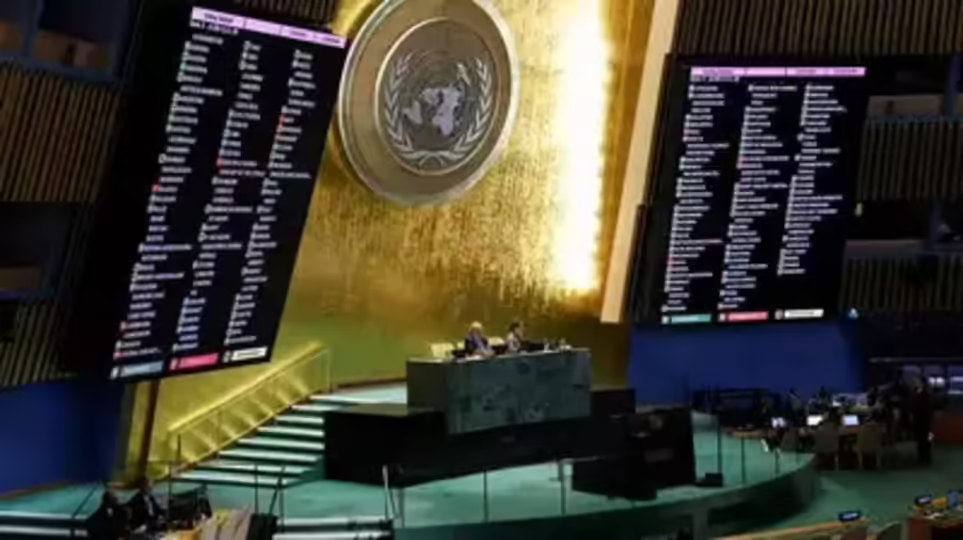UN Vote on Ukraine Reveals Divides: US, Russia, North Korea Among 17 Opposing Nations
Tue, 25 Feb 2025

A United Nations General Assembly (UNGA) resolution addressing Ukraine’s territorial integrity and sovereignty, introduced on [date], was adopted with 94 votes in favor, 17 against, and 73 abstentions. The resolution reaffirmed principles outlined in the UN Charter, including the prohibition of territorial acquisition by force, and called for a cessation of hostilities. Voting records indicate that 17 member states opposed the measure, including the United States, Russia, North Korea, Syria, Belarus, Nicaragua, Cuba, Venezuela, Mali, Burkina Faso, Eritrea, Ethiopia, Zimbabwe, Sudan, Central African Republic, Burundi, and Niger. This marks the fourth such UNGA resolution on Ukraine since Russia’s military escalation in February 2022, with opposition patterns reflecting geopolitical alliances and historical voting trends. The resolution’s text emphasized the inviolability of internationally recognized borders and urged compliance with International Court of Justice (ICJ) rulings, including the March 2022 order for Russia to suspend military operations. UN data shows that support for Ukraine-related resolutions has gradually declined since 2022, with the number of “yes” votes dropping from 141 in March 2022 to 94 in the latest session. Analysts attribute this shift to growing abstentions among African, Asian, and Latin American nations, many of which cite concerns over perceived imbalances in addressing global conflicts. Of the 17 opposing nations, Russia and Belarus have consistently voted against all UNGA resolutions critical of Moscow’s actions in Ukraine. Syria, North Korea, and Nicaragua have aligned with Russia in 92% of key UN votes since 2022, according to Security Council Report data. Meanwhile, Mali, Burkina Faso, and Niger—all governed by military-led administrations following recent coups—voted against the resolution for the first time, signaling shifting diplomatic postures in West Africa. Eritrea and Zimbabwe, historically critical of Western foreign policy, reinforced their opposition, while Cuba and Venezuela reiterated calls for “inclusive dialogue” over “escalatory measures.” The U.S. vote against the resolution marked a departure from its previous support for Ukraine-focused UN measures. A State Department spokesperson clarified that the opposition stemmed from the resolution’s exclusion of language condemning “all forms of aggression,” a formulation U.S. officials argued could dilute accountability. This stance aligns with Washington’s broader emphasis on multilateral frameworks prioritizing direct condemnation of Russia. However, European Union members, including France and Germany, supported the resolution, with the EU delegation stating it “underscores the global majority’s commitment to international law.” Abstentions comprised 40% of the vote, with India, South Africa, Saudi Arabia, Pakistan, and Thailand among the 73 nations opting for neutrality. India’s Permanent Representative cited the resolution’s failure to address “underlying security concerns” or reference earlier diplomatic initiatives, such as the Istanbul Communiqué of 2022. South Africa’s delegation echoed calls for “balanced mediation,” reflecting the African Union’s repeated appeals for conflict resolution outside “Cold War-era bloc politics.” Saudi Arabia and Pakistan emphasized humanitarian priorities, advocating for resource allocation to aid delivery over “politicized resolutions.” UN procedural guidelines highlight that General Assembly resolutions, unlike Security Council measures, are non-binding but carry symbolic weight as reflections of global opinion. The latest vote underscores persistent fractures in multilateral diplomacy, with opposition and abstention rates suggesting diminished consensus on Ukraine. Since 2022, average support for Ukraine-related UNGA resolutions has fallen by 18%, per UN voting archives, with opposition rising by 9%. Regional blocs, including the 55-member African Union, remain divided, as evidenced by Mali’s opposition and South Africa’s abstention despite earlier AU statements urging unity. Reactions to the vote varied widely. Ukraine’s Foreign Ministry praised the outcome as evidence of “continued global solidarity,” while Russia’s UN envoy dismissed the resolution as a “meaningless politicized gesture.” Chinese officials, whose delegation abstained, reiterated calls for “restraint and pragmatic peace talks.” Humanitarian organizations, including the International Committee of the Red Cross (ICRC), avoided direct commentary but stressed the urgency of protecting civilians amid ongoing hostilities. The resolution’s emphasis on territorial integrity mirrors language from prior UNGA texts, including the 2014 resolution condemning Russia’s annexation of Crimea, which received 100 votes in favor. Comparative data reveals that 27 nations previously supportive of Ukraine-related measures abstained or opposed the latest resolution, with 14 citing procedural or contextual objections. For instance, Mexico, which supported the 2022 resolution demanding Russia’s withdrawal, abstained this time, citing the need for “fresh mechanisms to bridge divides.” Voting records from the 17 opposing states indicate correlations with economic and military partnerships. Russia remains the primary arms supplier to nations like Mali and Burkina Faso, while Venezuela and Nicaragua rely heavily on Russian energy investments. Conversely, Eritrea and Zimbabwe, both under prolonged Western sanctions, have deepened diplomatic ties with Moscow in recent years. North Korea’s vote aligns with its February 2023 mutual defense pledge with Russia, which included commitments to “strategic cooperation in multilateral forums.” The UN Secretariat’s post-vote analysis noted that 62% of member states either supported or abstained, a marginal decline from 68% in 2023. Secretary-General António Guterres reaffirmed the UN’s neutrality but stressed that “the Charter’s principles remain the cornerstone of peace.” Independent researchers, such as the Stockholm International Peace Research Institute (SIPRI), warn that fragmented voting patterns may complicate future conflict mediation efforts, particularly in regions with overlapping security crises. As of [date], the conflict in Ukraine has resulted in over 10,000 civilian fatalities and 15 million displaced persons, according to UN Human Rights Office estimates. The General Assembly’s vote coincides with debates over proposed Security Council reforms, including expanded membership and veto-power limitations—a measure opposed by Russia, the U.S., and other permanent members. While the resolution’s adoption reinforces Ukraine’s diplomatic outreach, the opposition bloc’s cohesion highlights enduring challenges to consensus-building in an increasingly polarized global landscape.
